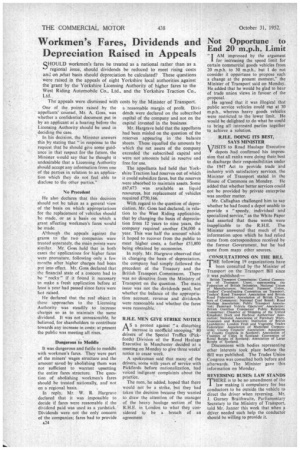Workmen's Fares, Dividends and Depreciation Raised in Appeals
Page 26

If you've noticed an error in this article please click here to report it so we can fix it.
SHOULD workmen's fares be treated as a national rather than as a
regional issue, should dividends be reduced to meet rising costs and on .what basis should depreciation be calculated? These questions were raised in the appeals of eight Yorkshire local authorities against the grant by the Yorkshire Licensing Authority of higher fares to the West Riding Automobile Co., Ltd., and the Yorkihire Traction Co., Ltd.
The appeals were dismissed with costs by the Minister of Transport.
One of the points raised by the appellants' counsel, Mr. A. Goss, was whether a confidential document put in by an applicant at a hearing before the Licensing Authority should be used in deciding the case.
Inhis decision, the Minister answers this by stating that " in response to the request that he should give some guidance in that respect for the future, the Minister would say that he thought it undesirable that a Licensing Authority should accept any information from one of the parties in relation to an application which they do not feel able to disclose to the other parties."
No Precedent
He also declares that this decision should not be taken as a general view of the basis on which appropriations for the replacement of vehicles should be made, or as a basis on which a grant affecting workmen's fares would be made.
Although the appeals against the grants to the two companies were treated separately, the main points were similar. Mr. Goss held that in both cases the applications for higher fares were premature, following only a few mr-nths after higher charges had been wit into effect. Mr. Goss declared that the financial state of a concern had to be " rocky" if it found it necessary to make a fresh application before at least a year had passed since fares were last raised.
Ile declared that the real object in these approaches to the Licensing Authority was steadily to increase charges so as to maintain the same dividend. It was not unreasonable, he believed, for shareholders to contribute towards any increase in costs: at present the public was meeting all rises.
Dangerous to Meddle
It was dangerous and futile to meddle with workmen's fares. They were part of the miners' wages structure and the amount saved by abolishing them was not sufficient to warrant upsetting the entire fares structure. The question of abolishing workmen's fares should be treated' nationally, and' not on a regional basis.
In reply, Mr. W. R. Hargrave declared that it was impossible to decide if fares were reasonable if the dividend paid was used as a yardstick. Dividends were not the only concern of the companies; fares had to provide
s24 a reasonable margin of profit. Dividends were declared on the subscribed capital of the company and not on the capital invested in the business.
Mr. Hargrave held that the appellants had been misled on the question of the reserves appearing in the balance sheets. These equalled the amounts by which the net assets of the company exceeded the subscribed capital and were not amounts held in reserve and free for use.
The appellants had held that Yorkshire Traction had reserves out of which it could subsidize fares, but the reserves were absorbed to maintain assets, Some £67,673 was available as liquid resources, but replacement of vehicles required £750,166.
With regard to the question of depreciation, Mr. Goss had declared, in relation to the West Riding application, that by changing the basis of depreciation from 12 years to nine years, the company required another £36,000 a year. This was half the amountwhich it hoped to recover from the public to meet higher costs, a further £53,800 being obtained by economies.
In reply, Mr. Hargrave observed that in changing the basis of depreciation. the company had simply followed the precedent of the Treasury and the British Transport Commission. There was no directive from the Ministry of Transport on the question. The main issue was not the dividends paid, but whether the balance of the appropriation account, revenue and dividends were reasonable and whether the fares were reasonable.
R.H.E. MEN GIVE STRIKE NOTICE
A'a protest against "a disturbing increase in unofficial snooping." 80 drivers of the Special Traffics (Pickfords) Division of the Road Haulage Executive in Manchester decided at a meeting on Monday to give three weeks' notice to cease work.
A spokesman said that many of the drivers, some with years of service with Pickfords before nationalization, had voiced indignant complaints about the practice.
The men, he added, hoped that there would not be a strike, but they had taken the decision because they wanted to draw the attention of the manager of the heavy haulage section of the R.H.E. in London to what they considered to be a breach of an agreement












































































